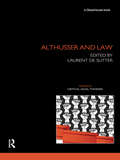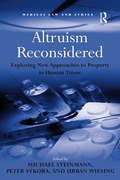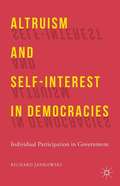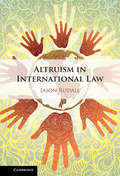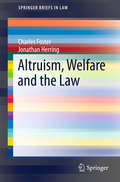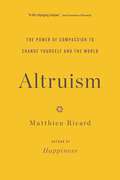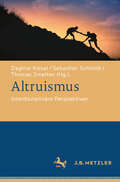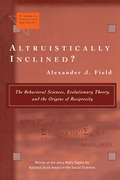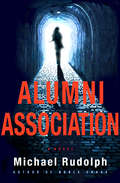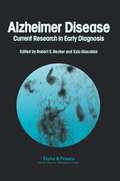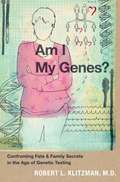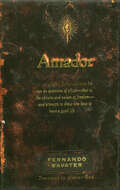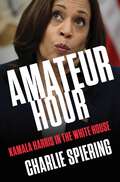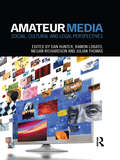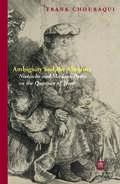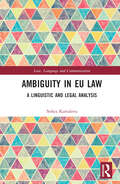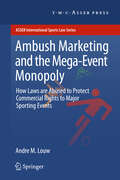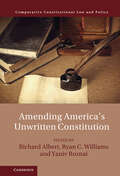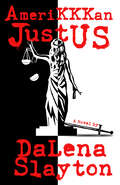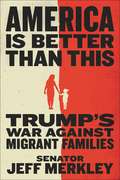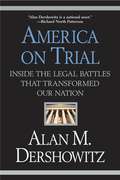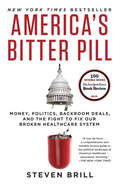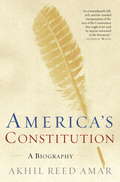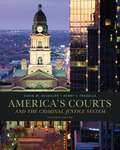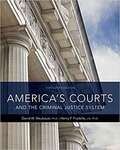- Table View
- List View
Althusser and Law (Nomikoi: Critical Legal Thinkers)
by Laurent De SutterAlthusser and Law is the first book specifically dedicated to the place of law in Louis Althusser’s philosophy. The growing importance of Althusser’s philosophy in contemporary debates on the left has - for practical and political, as well theoretical reasons - made a sustained consideration of his conception of law more necessary than ever. As a form of what Althusser called ‘Ideological State Apparatuses’, law is at the forefront of political struggles: from the destruction of Labour Law to the exploitation of Patent Law; from the privatisation of Public Law to the ongoing hegemony of Commercial Law; and from the discourse on Human Rights to the practice of judicial courts. Is Althusser still useful in helping us to understand these struggles? Does he have something to teach us about how law is produced, and how it is used and misused? This collection demonstrates that Althusser’s ideas about law are more important, and more contemporary, than ever. Indeed, the contributors to Althusser and Law argue that Althusser offers a new and invaluable perspective on the place of law in contemporary life.
Altruism Reconsidered: Exploring New Approaches to Property in Human Tissue (Medical Law and Ethics)
by Urban Wiesing Peter SýkoraAs the use of human body parts has become increasingly commercialized, a need has arisen for new approaches to regulation that moves beyond the paradigm of altruism. During the course of this discussion, the notion of property has become a key concept. Focusing on practical and conceptual perspectives, the multidisciplinary group of authors, which includes specialists in philosophy, law, sociology, biology and medicine, have come together with practicing lawyers to consider both legal provisions and patterns of regulation in countries across Europe. Identifying divergences between different legal traditions, the authors explore various conceptual models which could be used to improve and to guide policy making. With this twin focus on practical and conceptual perspectives, this volume sets the standard for a detailed and innovative discussion of issues surrounding the regulation of research on human tissue.
Altruism and Self-Interest in Democracies
by Richard JankowskiIndividuals have little incentive to vote, acquire political information or contribute campaign funds, because their vote has very little chance of affecting the outcome of an election. Jankowski offers an explanation and evidence for political participation based on the assumption that most individuals are weakly altruistic. Other proposed explanations of political participation (civic duty and expressive behavior) are not supported by the evidence, or fail to explain the many different forms of political participation, such as the acquisition of political information. Evidence is presented that liberals and conservatives are equally altruistic. Therefore, an explanation of why liberals and conservatives differ in their support of various government programs to help the needy is presented. Jankowski's analysis examines both the electoral and post-electoral phases of representative democracy.
Altruism in International Law
by Jason RudallMuch emphasis has been placed on the role that individualism, self-interest and reciprocity have in the formation and function of international legal rules. Rarely has attention been given to the presence of altruism in legal systems, let alone the international legal system. In a study that is the first of its kind in international legal scholarship, Altruism in International Law explores and analyses the emergence of altruistic legal relationships between states and people in other countries. The book also argues that the impulse for the emergence of these relationships is a cosmopolitan ideology, which co-exists with a persisting statist ideology, among the major actors in international law-making processes. Further still, the book reveals that individualistic legal norms are more often manifested as strict rules while altruistic legal norms find expression in flexible standards. This suggests that there is a connection between substance and form in international law.
Altruism, Welfare and the Law (SpringerBriefs in Law #0)
by Charles Foster Jonathan HerringThis book is an assault on the notion that it is empirically accurate and legally and philosophically satisfactory to see humans as atomistic entities. It contends that our welfare is inextricably entangled with that of others, and accordingly law and ethics, in determining our best interests, should recognise the central importance of relationality, the performance of obligations, and (even apparently injurious) altruism.
Altruism: The Power of Compassion to Change Yourself and the World
by Matthieu RicardThe author of the international bestseller Happiness makes a passionate case for altruism--and why we need it now more than ever.In Happiness, Matthieu Ricard demonstrated that true happiness is not tied to fleeting moments or sensations, but is an enduring state of soul rooted in mindfulness and compassion for others. Now he turns his lens from the personal to the global, with a rousing argument that altruism--genuine concern for the well-being of others--could be the saving grace of the 21st century. It is, he believes, the vital thread that can answer the main challenges of our time: the economy in the short term, life satisfaction in the mid-term, and environment in the long term. Ricard's message has been taken up by major economists and thinkers, including Dennis Snower, Amartya Sen, Joseph Stiglitz, and George Soros.Matthieu Ricard makes a robust and passionate case for cultivating altruistic love and compassion as the best means for simultaneously benefitting ourselves and our society. It's a fresh outlook on an ardent struggle--and one that just might make the world a better place.
Altruismus: Interdisziplinäre Perspektiven
by Sebastian Schmidt Dagmar Kiesel Thomas SmettanAltruismus scheint im Alltagsverständnis seinen uneingeschränkt positiven Ruf als ebenso wünschenswerte wie seltene Tugend verloren zu haben und durch ein Ethos des Eigennutzens ersetzt worden zu sein. Angesichts globaler Krisen wie dem Klimawandel, großer Flüchtlingsbewegungen, Kriege und Armut ist die Bereitschaft zur Verhaltensänderung bzw. zum Verzicht zugunsten kommender Generationen oder hilfsbedürftiger Menschen weniger selbstverständlich als das Phänomen der psychologischen Reaktanz und die Weigerung, Einschränkungen der persönlichen Freiheit oder des Konsums hinzunehmen. Zeitgenössische Ethikerinnen und Ethiker müssen sich demnach mit der Frage nach der Motivation für ein Handeln auseinandersetzen, das in erster Linie nicht dem eigenen Wohl, sondern dem Wohl anderer dient. In diesem Sinne beleuchtet der vorliegende Band das Thema Altruismus in seinen verschiedenen, wechselseitig aufeinander verweisenden Facetten: Wie ist das Wesen altruistischen Handelns zu bestimmen? Liegt Altruismus in der Natur des Menschen? Lässt sich Altruismus widerspruchsfrei in verschiedene Ethiktypen einordnen? Wie verstehen verschiedene philosophische Traditionen und Religionen den Altruismus? In welchem Verhältnis steht der Altruismus zum guten Leben? Und: Wie ist altruistisches Handeln motiviert? Da diese Fragen in verschiedenen Fachwissenschaften und mit unterschiedlichen Perspektivierungen gestellt werden, ist dieser Sammelband interdisziplinär konzipiert: Philosophie und Religionswissenschaft kommen ebenso zu Wort wie Verhaltensökonomie und Evolutionsbiologie. Auch anthropologische, soziologische und psychologische Zusammenhänge werden beleuchtet. Dementsprechend richten sich die hier versammelten Aufsätze an ein sehr breit gefächertes akademisches Publikum, aber auch an eine interessierte öffentliche Leserschaft außerhalb des universitären Kontexts. Mit Blick auf diese Zielgruppen führen die einzelnen Beiträge in das jeweilige Thema ein und präsentieren gleichzeitig eine eigene Forschungsposition der Autorin bzw. des Autors.
Altruistically Inclined?: The Behavioral Sciences, Evolutionary Theory, and the Origins of Reciprocity
by Alexander J. FieldAlexander J. Field is the Michel and Mary Orradre Professor of Economics at Santa Clara University.
Alumni Association: A Novel
by Michael RudolphThe acclaimed author of Noble Chase lays down the law with an irresistible tale of buried secrets and gloves-off legal combat at a secretive military school—for readers of John Grisham, Greg Iles, and Linda Fairstein. When young attorney Beth Swahn agrees to represent a former military academy facing demolition, what begins as a simple real estate litigation soon becomes a dangerously real threat. Beth’s stepfather, a founding partner at her law firm, is part of the now-shuttered school’s alumni association that’s determined to see its old campus preserved as a historical landmark, safe from developers’ bulldozers. But beneath the campus’s main building—once the nineteenth-century mansion of Napoleon Bonaparte’s older brother—runs an extensive network of tunnels, which may be where the alumni’s true interest lies . . . along with their school days’ darkest secrets. As more of the academy’s former cadets become entangled in the case, and millions of dollars mysteriously go missing, Beth faces increasingly treacherous legal landmines—and worse—in a case that could be more than just a career killer. Michael Rudolph’s gripping legal thrillers featuring Beth Swahn can be enjoyed together or separately: NOBLE CHASE • ALUMNI ASSOCIATION
Alzheimer's Disease: Current Research In Early Diagnosis
by Robert E. Becker; Ezio GiacobiniThis book examines the relevance of current research for the early diagnosis of Alzheimer disease. It uncovers the present lack of clinical utility in research methodologies such as neuroimaging, drug challenges, electroencephalographs studies, and brain biopsy.
Am I My Genes?: Confronting Fate And Family Secrets In The Age Of Genetic Testing
by Robert L. KlitzmanIn the fifty years since DNA was discovered, we have seen extraordinary advances. For example, genetic testing has rapidly improved the diagnosis and treatment of diseases such as Huntington's, cystic fibrosis, breast cancer, and Alzheimer's. But with this new knowledge comes difficult decisions for countless people, who wrestle with fear about whether to get tested, and if so, what to do with the results. <p><p> Am I My Genes? shows how real individuals have confronted these issues in their daily lives. Robert L. Klitzman interviewed 64 people who faced Huntington's Disease, breast and ovarian cancer, or Alpha-1 antitrypsin deficiency. The book describes--often in the person's own words--how each has wrestled with the vast implications that genetics has for their lives and their families. Klitzman shows how these men and women struggle to make sense of their predicament and its causes. They confront a series of quandaries--whether to be tested; whether to disclose their genetic risks to parents, siblings, spouses, offspring, friends, doctors, insurers, employers, and schools; how to view and understand themselves and their genetics; what treatments, if any, to pursue; whether to have children, adopt, screen embryos, or abort; and whether to participate in genetic communities. In the face of these uncertainties, they have tried to understand these tests and probabilities, avoid fatalism, anxiety, despair, and discrimination, and find hope, meaning, and a sense of wholeness. Forced to wander through a wilderness of shifting sands, they chart paths that many others may eventually follow. <p> Klitzman captures here the voices of pioneers, some of the first to encounter the personal dilemmas introduced by modern genetics. Am I My Genes? is an invaluable account of their experience, one that will become all the more common in the coming years.
Amador: A Father Talks To His Son About Happiness, Freedom, And Love
by Fernando SavaterIn a series of letters to his son, the renowned Spanish philosopher delivers sage advice on living an ethical life in today’s world.One of Europe’s foremost ethicists, Fernando Savater presents a deeply personal inquiry into the art of living well—one addressed to his own teenage son, Amador. In a series of personal letters, Savater encourages his son to recognize his own agency and use it responsibly, to think freely, and to make decisions that are both well-reasoned and empathetic. Amador is a heartfelt and enlightening primer for modern life, and an inspiration for any parent wishing to impart wisdom to their children.
Amateur Hour: Kamala Harris in the White House
by Charlie SpieringThe ultimate, comprehensive investigation into the life and career of Vice President Kamala Harris from former Washington Examiner and Breitbart News political reporter Charlie Spiering.Who is the real Kamala Harris? And how did she ascend to the second highest office in the country? Despite her limited experience in national politics and confusing professional history, there hasn&’t been a comprehensive examination of Vice President Kamala Harris&’s journey to the White House...until now. Find out how the San Francisco socialite turned politico fast-tracked her way onto the national stage, only to lose the faith of her base and her president. With exclusive reporting and a detective&’s eye, Charlie Spiering delivers the first-ever deep dive into Kamala Harris&’s hilarious, incompetent, radical path to the vice presidency. From her tumultuous tenure as California prosecutor to the fiery interrogator in the United States Senate, then to her disastrous presidential campaign and finally, her calamitous first years in executive office, this is an unfettered look at the woman who is only one heartbeat away from leading the free world.
Amateur Media: Social, cultural and legal perspectives
by Julian Thomas Megan Richardson Dan Hunter Ramon LobatoThe rise of Web 2.0 has pushed the amateur to the forefront of public discourse, public policy and media scholarship. Typically non-salaried, non-specialist and untrained in media production, amateur producers are now seen as key drivers of the creative economy. But how do the activities of citizen journalists, fan fiction writers and bedroom musicians connect with longer traditions of extra-institutional media production? This edited collection provides a much-needed interdisciplinary contextualisation of amateur media before and after Web 2.0. Surveying the institutional, economic and legal construction of the amateur media producer via a series of case studies, it features contributions from experts in the fields of law, economics and media studies based in the UK, Europe and Singapore. Each section of the book contains a detailed case study on a selected topic, followed by two further pieces providing additional analysis and commentary. Using an extraordinary array of case studies and examples, from YouTube to online games, from subtitling communities to reality TV, the book is neither a celebration of amateur production nor a denunciation of the demise of professional media industries. Rather, this book presents a critical dialogue across law and the humanities, exploring the dynamic tensions and interdependencies between amateur and professional creative production. This book will appeal to both academics and students of intellectual property and media law, as well as to scholars and students of economics, media, cultural and internet studies.
Ambiguity and the Absolute: Nietzsche and Merleau-Ponty on the Question of Truth (Perspectives in Continental Philosophy)
by Frank ChouraquiFriedrich Nietzsche and Maurice Merleau-Ponty, Chouraqui argues, are linked by how they conceive the question of truth. Although both thinkers criticize the traditional concept of truth as objectivity, they both find that rejecting it does not solve the problem. What is it in our natural existence that gave rise to the notion of truth?The answer to that question is threefold. First, Nietzsche and Merleau-Ponty both propose a genealogy of “truth” in which to exist means to make implicit truth claims. Second, both seek to recover the preobjective ground from which truth as an erroneous concept arose. Finally, this attempt at recovery leads both thinkers to ontological considerations regarding how we must conceive of a being whose structure allows for the existence of the belief in truth. In conclusion, Chouraqui suggests that both thinkers’ investigations of the question of truth lead them to conceive of being as the process of self-falsification by which indeterminate being presents itself as determinate.
Ambiguity in EU Law: A Linguistic and Legal Analysis (Law, Language and Communication)
by Sofiya KartalovaAmbiguity – an expression or utterance giving rise to at least two mutually exclusive interpretations – has been traditionally regarded as an ever-present, and therefore trivial, feature of EU law, alongside other forms of linguistic indeterminacy. At the same time, ambiguity has been condemned as a perilous defect in the legal text, since it is commonly assumed that the Court of Justice of the EU (CJEU) would necessarily exploit it to engage in judicial activism. In contrast, more recent theories present ambiguity as a means of promoting greater acceptability and coherence, while trusting the CJEU’s willingness to exert judicial restraint for the benefit of judicial co-operation. This ground-breaking work challenges some of the theoretical assumptions about ambiguity in EU law and puts forward a more accurate and complete theory about the CJEU’s strategic use of ambiguity. Ambiguity is here transformed from an underestimated or misunderstood detail of undetermined significance to a desirable systemic feature of the EU legal order with concrete properties and impact. Ambiguity as the implicit basis of the CJEU’s decision-making is shown to be strategically valuable for the implementation of the authority of EU law at some of the most pivotal moments in the evolution of the EU legal order. This interdisciplinary investigation presents in-depth linguistic and legal analysis of ambiguity found in the text of key provisions of EU Treaties and in the language of some of the CJEU’s leading preliminary rulings in the area of fundamental rights, freedom of movement and EU citizenship. The book suggests a categorisation of examples, basic guidance about the type of case and situation where the phenomenon is likely to emerge as well as an assessment of the advantages and disadvantages of this unusual judicial technique. The book will be a valuable resource for researchers and academics working in the areas of Law and Language, Public International Law, EU Law and Multilingualism.
Ambush Marketing & the Mega-Event Monopoly: How Laws are Abused to Protect Commercial Rights to Major Sporting Events (ASSER International Sports Law Series)
by Andre M. LouwThis book undertakes a critical examination of commercial rights to sports mega-events (focusing on sponsorship), the exclusivity of such rights and the legal implications of the modern mega-event sponsorship model. It examines ambush marketing of events and the law's treatment of ambushing (specifically in the form of sui generis event legislation) in a review of 10 major jurisdictions selected on the basis of the importance of the events they are to host in the near future or have hosted recently, and the relevant domestic legislation. It critically examines the legitimacy of such commercial rights protection by means of the use of laws in the context of accepted principles of intellectual property law, competition law and human rights law. Specifically, it questions the legitimacy of the creation of statutory 'association rights' to mega-events, and considers potential future developments in respect of the law's treatment of mega-event commercialisation. Valuable for practitioners and academics (in the fields of sportslaw/sponsorship/marketing/intellectual property law); sports administrators (sports governing bodies); corporate sponsors of sports and other events; potential mega-event host governments and law-makers; civil rights organisations.
Amending America's Unwritten Constitution (Comparative Constitutional Law and Policy)
by Richard Albert Ryan C. Williams Yaniv RoznaiIt is well known that the US Constitution has been amended twenty-seven times since its creation in 1787, but that number does not reflect the true extent of constitutional change in America. Although the Constitution is globally recognized as a written text, it consists also of unwritten rules and principles that are just as important, such as precedents, customs, traditions, norms, presuppositions, and more. These, too, have been amended, but how does that process work? In this book, leading scholars of law, history, philosophy, and political science consider the many theoretical, conceptual, and practical dimensions of what it means to amend America's 'unwritten Constitution': how to change the rules, who may legitimately do it, why leaders may find it politically expedient to enact written instead of unwritten amendments, and whether anything is lost by changing the constitution without a codified constitutional amendment.
AmeriKKKan JustUS
by DeLena SlaytonAmeriKKKan JustUS is the story of a young African-American man&’s journey through the court system. Evocative and deeply personal, this novel gives a first-person account of racism in the justice system.Author DaLena Slayton is a new voice in Black American fiction, and she creates a powerful portrait of a young man finding his way in a sometimes hostile society.The world is black and white, but Rilei tends to live in a gray area until life forces him to open his eyes. From his sheltered childhood to his rude awakening to reality, Rilei is forced to learn how to be a survivor in the ghetto streets of Akron, Ohio.Being a survivor also means that he'll have to learn how to accept that the world doesn't come in different shades of gray, and that he is on the wrong side of black and white. When he enters the criminal justice system, he finds it rigged against him from the beginning. Can Rilei tell his story and change the fate society has written for him? On the wrong side of the color line, is American justice possible, or is it just us? Buy AmeriKKKan JustUS to learn Rilei's story, American criminal justice through the eyes of one black man
America Is Better Than This: Trump's War Against Migrant Families
by Jeff MerkleyAn exposé and cry of outrage at the cruelty and chaos the Trump administration has wrought at the border with child separations, border blockades, and a massive gulag of child prisons housing thousands. p.p1 {margin: 0.0px 0.0px 0.0px 0.0px; font: 12.0px 'Times New Roman'} p.p2 {margin: 0.0px 0.0px 0.0px 0.0px; text-indent: 36.0px; font: 12.0px 'Times New Roman'} Jeff Merkley couldn't believe his eyes. He never dreamed the United States could treat vulnerable young families with such calculated brutality. Few had witnessed what Merkley discovered just by showing up at the border and demanding to see what was going on behind closed doors.Contrary to the official stories and soothing videos, he found mothers and children, newborn babies and infants, stranded for days on border bridges in blistering heat or locked up in ice-cold holding pens. There were nearly 1,500 boys jammed into a former Walmart, a child tent prison in the desert with almost 3,000 boys and girls, and children struggling to survive in gang-filled Mexican border towns after they were blocked from seeking asylum in the United States.Worst of all, there were the children ripped out of their parents' arms and sorted into cages in some profoundly warped attempt to discourage migration. This was how the Trump administration treated the child victims of unspeakable violence that had driven them from their homes: as pawns in a power play rather than as humans worthy of respect and dignity.It was Merkley's visits -- captured live on viral video -- that triggered worldwide outrage at the forced separation of children from their parents. Just by taking an interest -- by caring about the people legally claiming asylum at America's borders -- Merkley helped expose the Trump administration's war on migrant families. Along the way, he helped turn the tide against some of its worst excesses.AMERICA IS BETTER THAN THIS tells the inside story of how one senator, with no background as an immigration activist, became a leading advocate for reform of the brutal policies that have created a humanitarian crisis on the southern U.S. border. It represents the heartfelt and candid voice of a concerned American who believes his country stands for something far bigger and better.
America on Trial: Inside the Legal Battles That Transformed Our Nation
by Alan M. DershowitzOne might wonder how the trial of Mike Tyson or Lizzie Borden "transformed our nation" as opposed to other cases included by Dershowitz (law, Harvard U.), such as the Brown vs. Board of Education or Bush vs. Gore, but the reasoning behind the selection becomes clearer when he notes that the "basic criterion is passion" (i.e. a reflection of the passion of the times, arousing the passion of Americans, etc.). Basing his narratives of 64 American trials on the actual transcripts from the courtroom, he describes such cases as the trials of John Peter Zenger, Aaron Burr, Sacco and Vanzetti, Leopold and Loeb, the Rosenbergs, American Indian Movement activists, Bernhard Goetz, and John DeLorean. Annotation ©2004 Book News, Inc., Portland, OR (booknews.com)
America's Bitter Pill: Money, Politics, Backroom Deals, and the Fight to Fix Our Broken Healthcare System
by Steven BrillAmerica's Bitter Pill is Steven Brill's much-anticipated, sweeping narrative of how the Affordable Care Act, or Obamacare, was written, how it is being implemented, and, most important, how it is changing--and failing to change--the rampant abuses in the healthcare industry. Brill probed the depths of our nation's healthcare crisis in his trailblazing Time magazine Special Report, which won the 2014 National Magazine Award for Public Interest. Now he broadens his lens and delves deeper, pulling no punches and taking no prisoners. It's a fly-on-the-wall account of the fight, amid an onslaught of lobbying, to pass a 961-page law aimed at fixing America's largest, most dysfunctional industry--an industry larger than the entire economy of France. It's a penetrating chronicle of how the profiteering that Brill first identified in his Time cover story continues, despite Obamacare. And it is the first complete, inside account of how President Obama persevered to push through the law, but then failed to deal with the staff incompetence and turf wars that crippled its implementation. Brill questions all the participants in the drama, including the president, to find out what happened and why. He asks the head of the agency in charge of the Obamacare website how and why it crashed. And he tells the cliffhanger story of the tech wizards who swooped in to rebuild it. Brill gets drug lobbyists to open up on the deals they struck to protect their profits in return for supporting the law. And he buttresses all these accounts with meticulous research and access to internal memos, emails, notes, and journals written by the key players during all the pivotal moments. Brill is there with patients when they are denied cancer care at a hospital, or charged $77 for a box of gauze pads. Then he asks the multimillion-dollar executives who run the hospitals to explain why. He even confronts the chief executive of America's largest health insurance company and asks him to explain an incomprehensible Explanation of Benefits his company sent to Brill. And he's there as a group of young entrepreneurs gamble millions to use Obamacare to start a hip insurance company in New York's Silicon Alley. Vividly capturing what he calls the "milestone" achievement of Obamacare, Brill introduces us to patients whose bank accounts or lives have been saved by the new law--although, as he explains, that is only because Obamacare provides government subsidies for "tens of millions of new customers" to pay the same exorbitant prices that were the problem in the first place. All that is weaved together in an elegantly crafted, fast-paced narrative. But by chance America's Bitter Pill ends up being much more--because as Brill was completing this book, he had to undergo urgent open-heart surgery. Thus, this also becomes the story of how one patient who thinks he knows everything about healthcare "policy" rethinks it from a hospital gurney--and combines that insight with his brilliant reporting. The result: a surprising new vision of how we can fix American healthcare so that it stops draining the bank accounts of our families and our businesses, and the federal treasury.From the Hardcover edition.
America's Constitution: A Biography
by Akhil Reed AmarIn America's Constitution, one of this era's most accomplished constitutional law scholars, Akhil Reed Amar, gives the first comprehensive account of one of the world's great political texts. Incisive, entertaining, and occasionally controversial, this "biography" of America's framing document explains not only what the Constitution says but also why the Constitution says it. <p><p>We all know this much: the Constitution is neither immutable nor perfect. Amar shows us how the story of this one relatively compact document reflects the story of America more generally. (For example, much of the Constitution, including the glorious-sounding "We the People," was lifted from existing American legal texts, including early state constitutions.) In short, the Constitution was as much a product of its environment as it was a product of its individual creators' inspired genius. <p>Despite the Constitution's flaws, its role in guiding our republic has been nothing short of amazing. Skillfully placing the document in the context of late-eighteenth-century American politics, America's Constitution explains, for instance, whether there is anything in the Constitution that is unamendable; the reason America adopted an electoral college; why a president must be at least thirty-five years old; and why-for now, at least-only those citizens who were born under the American flag can become president. <p>From his unique perspective, Amar also gives us unconventional wisdom about the Constitution and its significance throughout the nation's history. For one thing, we see that the Constitution has been far more democratic than is conventionally understood. Even though the document was drafted by white landholders, a remarkably large number of citizens (by the standards of 1787) were allowed to vote up or down on it, and the document's later amendments eventually extended the vote to virtually all Americans. We also learn that the Founders' Constitution was far more slavocratic than many would acknowledge: the "three fifths" clause gave the South extra political clout for every slave it owned or acquired. <p>As a result, slaveholding Virginians held the presidency all but four of the Republic's first thirty-six years, and proslavery forces eventually came to dominate much of the federal government prior to Lincoln's election. <p>Ambitious, even-handed, eminently accessible, and often surprising, America's Constitution is an indispensable work, bound to become a standard reference for any student of history and all citizens of the United States. <p>[This text is listed as an example that meets Common Core Standards in English language arts in grades 11-12 at http://www.corestandards.org.]
America's Courts And The Criminal Justice System
by David W. Neubauer Henry F. FradellaOpen this book and step into America's court system! With Neubauer and Fradella's best seller, you will see for yourself what it is like to be a judge, a prosecutor, a defense attorney, and more. This fascinating and well-researched book gives you a realistic sense of being in the courthouse, enabling you to quickly gain an understanding of what it is like to work in and be a part of the American criminal justice system. The book's approach, which focuses on the courthouse "players," makes it easy to understand each person's important role in bringing a case through the court process. Throughout the book, the authors highlight not only the pivotal role of the criminal courts but also the court's importance and impact on society as a whole.
America's Courts and the Criminal Justice System
by David W. Neubauer Henry F. FradellaOpen this book and step into America's court system! With Neubauer and Fradella's best-selling text, you'll get an inside view of the experiences of a judge, a prosecutor, a defense attorney, and more. <p><p> This fascinating and well-researched text gives you a realistic sense of being in the courthouse, enabling you to quickly grasp what it's like to work in and be a part of the American criminal justice system. The book's approach, which focuses on the courthouse "players," makes it easy to understand each person's important role in bringing a case through the court process. Throughout, the authors highlight not only the pivotal role of the criminal courts but also the court's importance and impact on society as a whole.
